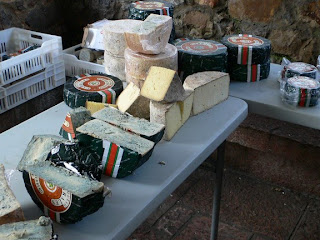 Last weekend was the slow food exhibition in Bilbao “Algusto”, so it seemed a good opportunity to write a little about the slow food movement, slow food in Asturias and what we do on the farm and hotel with respect to slow food.
Last weekend was the slow food exhibition in Bilbao “Algusto”, so it seemed a good opportunity to write a little about the slow food movement, slow food in Asturias and what we do on the farm and hotel with respect to slow food.Slow food was founded in 1989 to counteract fast food and the disappearance of local food traditions. It also tries to increase people’s interest in the food they eat, where it comes from, how it tastes and how our food choices affect the world around us. Today the Slow Food Association is a vast network of 100,000 members from 150 countries, grouped in local chapters called convivia, of which there is one in Asturias.

 In Asturias there are four products which are in the Ark of Taste catalogue, they are; Asturian spelt, Xalda sheep, Natural Cider and Fresh Beans.
In Asturias there are four products which are in the Ark of Taste catalogue, they are; Asturian spelt, Xalda sheep, Natural Cider and Fresh Beans. Selection of products made with spelt flour.
Selection of products made with spelt flour. 
Xalda sheep on our farm
The Xalda sheep, indigenous to Asturias, is one of the oldest breeds of sheep in Spain. On the farm we have been breeding them for the last 12 years and regularly put Xalda lamb on the menu in the hotel restaurant. The meat is of excellent flavour and of a fibrous but tender texture.

Pouring natural cider.
Natural cider is the traditional drink in Asturias and has come to be a reference for the Asturian gastronomy. Apple plantations form a central part of the Asturian landscape reflecting the importance of cider in Asturias. On the farm we have 3 hectares of Asturian cider apples and although we do not make natural cider we make a natural apple juice. To try natural cider whilst in Asturias we recommend you visit a “chigre” (traditional cider bar.)

A selection of beans for sale at the Colunga local bean fair.
The fourth Asturian Ark of Taste “Fresh Beans” is a minority product at the moment. Its major difference with the traditional dried bean is that the beans are picked before they start drying. Beans are an integral part of the Asturian diet and there are many different types which are grown and sold in the region. There are various specialist been markets celebrated in Asturias throughout the year. At the hotel we grow different types of dried been and regularly incorporate them in the food we serve in the restaurant.

In the hotel restaurant; Xalda lamb with Canela beans and Mangetout, all produced on the hotel farm and waiting to be eaten!
More information on slow food
More information on the food we serve in the hotel
More information on Xalda sheep



 Making the most of trees for fire wood
Making the most of trees for fire wood Cutting hay with a scythe for winter food for the sheep
Cutting hay with a scythe for winter food for the sheep